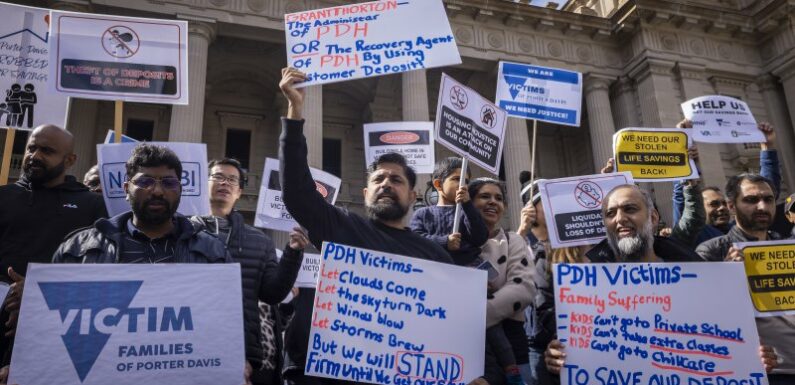
Save articles for later
Add articles to your saved list and come back to them any time.
There was a sigh of relief this week from a minority of the beleaguered families caught up in the sudden collapse of the Porter Davis group of building companies. Liquidators seeking interest in all or part of the business have confirmed an outfit called Nostra Property Group will complete up to 126 townhouses already in various stages of construction and have said the firm has the option to build another 169 homes that were sold off the plan.
Yet that still leaves in limbo the owners of the majority of uncompleted Porter Davis properties, which total some 1700 across Victoria and Queensland, most of whom are now holding out for another developer to step up, which appears unlikely, or are wading into the actuarial hell that is finding out what their builders’ insurance will or won’t cover.
Protesters called for support from the Victorian government on the steps of parliament on Sunday.Credit: Wayne Taylor
It turns out some of the home buyers may not even have cover at all, despite there being a legal requirement for the builder to purchase it before any money changes hands.
The episode has demonstrated that regulations supposed to protect Victorians from exactly this eventuality have failed them and must be urgently reviewed. In the midst of a housing crisis, a volatile economy, pressure from rising interest rates and persistent inflation, we can ill afford a collapse in confidence among would-be home buyers who fear they too might be unwittingly caught up in another “Porter Davis”.
Known in the trade as DBI, domestic building insurance is designed to compensate aggrieved home owners by up to $300,000 should their builder, specifically, become insolvent, die or just disappear before work is completed. This is not well known – nor could it be expected to be well known. Indeed, the Essential Services Commission, which monitored the effectiveness or otherwise of DBI from 2010 to 2019, noted in 2012 that “DBI is an obscure product, and the majority of the population will go through life without ever hearing of it”.
It appears some Porter Davis customers were not even aware that the builder was supposed to provide them with a certificate of insurance before – not after – they paid their deposit, irrespective of whether a contract had been signed. The liquidators have suggested some may have been caught in a gap between payment, insurance being sought and the company collapsing, and as such may have no recourse.
Investigations are ongoing but it turns out this is not uncommon in the industry: The Age has subsequently uncovered several examples of builders being fined by the Victorian Building Authority for insurance breaches and has obtained contracts that show a major home builder delayed taking out insurance on two occasions, leaving its clients exposed.
For those Porter Davis customers who are covered, the prospects of recovering at least some of their money are strong, going on historical statistical analysis conducted by the Essential Services Commission. Even then, the process may well be protracted, with an average wait of 429 days, or just over 14 months, for payout since the scheme’s inception – a long time for a half built house to sit empty, or for a buyer to pay rent somewhere else while preparing to engage a new builder, probably at an ever-increasing cost over the original contract. Even the commission describes the delay between application and payout as “a significant inconvenience”.
After initially appearing reluctant to offer government assistance to save the Porter Davis company, Premier Daniel Andrews said on Sunday that he was open to helping its customers. “We can potentially support them,” he said.
This is a positive development given the opacity of the DBI scheme. We have previously argued that taxpayers should not be on the hook for the failure of a private business, but it now appears that a government-supported safety net has failed some consumers who could rightly expect better protection.
Andrews has also flagged an inquiry into what he called “lasting reforms”. He should start with the suggestion from Wayne Farnham, the Liberal member for Narracan and a former builder, for all deposits for building work to be held in trust until the building insurance certificate is issued – an idea that seems both sensible and relatively straightforward to implement.
Patrick Elligett sends an exclusive newsletter to subscribers each week. Sign up to receive his Note from the Editor.
Most Viewed in National
From our partners
Source: Read Full Article
